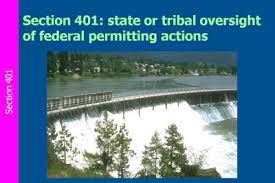From an Article by John McFerrin, WV Highlands Conservancy Voice, July 2022
States, including West Virginia, have gained more control over the issuance of permits under the federal Clean Water Act.
Under the federal and state Clean Water Acts, anybody who wants to undertake a wide variety of activities which have an impact upon water must have a permit. These include discharging water into a stream, filling a stream, or crossing a stream or a wetland. Most recently this requirement has meant that both the Atlantic Coast Pipeline and the Mountain Valley Pipeline have been required to have permits for pipeline construction.
These permits are issued by federal agencies. Under the law as it historically existed, even when federal agencies issue permit decisions, states still had a role. Under Section 401 of the federal Clean Water Act, federal agencies could not authorize projects in a state unless that state certifies (called a 401 Certification) that the project will not violate state water quality standards.
Our most recent experiences with this are the Mountain Valley Pipeline and the Atlantic Coast Pipeline. With those two pipelines, or any other project where federal agencies issue water permits, West Virginia could have stopped the project by refusing the 401 Certification. If it did not want to refuse the 401 Certification outright, it could have conditioned its approval on the pipeline developers taking certain steps to protect water quality.
The reason for this requirement of state certification were explained during the original debates on the federal Clean Water Act. Senator Muskie explained on the floor when what is now §401 was first proposed: “No polluter will be able to hide behind a Federal license or permit as an excuse for a violation of water quality standard[s]. No polluter will be able to make major investments in facilities under a Federal license or permit without providing assurance that the facility will comply with water quality standards. No State water pollution control agency will be confronted with a fait accompli by an industry that has built a plant without consideration of water quality requirements.”
In the spring of 2020, the United States Environmental Protection Agency issued a new rule dramatically reducing the authority that states have to refuse certification or demand conditions on permits. This was in response to complaints about other states imposing too many conditions upon pipeline construction or refusing certifications altogether. For the reasons mentioned below, there were no complaints about West Virginia authorities.
Now the United States Environmental Protection Agency has changed the rule back to what it was historically. The states once again have the authority to review federal permits and certify that a project will not cause a violation of water quality standards. If a project needs conditions to protect state waters, states can demand those conditions.
Does West Virginia really care?
If recent experience is any guide, regaining this authority will not make any difference to West Virginia. Both the Atlantic Coast Pipeline and the Mountain Valley Pipeline had to have permits to cross streams and wetlands in West Virginia. Through the 401 Certification process, West Virginia could have prevented the Federal Energy Regulatory Commission from finally approving the pipeline as well as the United States Army Corps of Engineers from approving the stream crossings, etc. that the pipeline will entail until we had assurance that West Virginia’s water would not be damaged. West Virginia had the opportunity to either stop the project entirely or, more likely, place conditions upon it that would make it less damaging to West Virginia waters.
Instead of reviewing the projects and either rejecting them or placing conditions upon them, West Virginia waived its right to do so. For the details, see the stories in the December, 2017, and January, 2018, issues of The Highlands Voice.
While the restoration of authority might make a difference in some states, it is not clear that it will make any difference in West Virginia. When the West Virginia Department of Environmental Protection had the authority before, it did not use it. There is nothing to indicate that having it back will make any difference. The current West Virginia Department of Environmental Protection has no interest in using the right which the Clean Water Act grants it anyway.
######£+++++++#######+++++++#######
The West Virginia Highlands Conservancy is a non-profit corporation which has been recognized as a tax exempt organization by the Internal Revenue Service. Its bylaws describe its purpose:
The purposes of the Conservancy shall be to promote, encourage, and work for the conservation — including both preservation and wise use — and appreciation of the natural resources of West Virginia and the Nation, and especially of the Highlands Region of West Virginia, for the cultural, social, educational, physical, health, spiritual, and economic benefit of present and future generations of West Virginians and Americans.


{ 1 comment… read it below or add one }
Pipeline explosion Texas today: Flames from blast could be seen 30 miles away; residents evacuated
FORT BEND COUNTY, Texas — Emergency crews brought the flames from a pipeline explosion in Texas under control about an hour after the blaze occurred.
The explosion happened in Wallis, Texas, about 50 miles west of Houston. On the way to the scene, ABC Houston affiliate KTRK’s helicopter noticed the flames could be seen from 30 miles away.
A pipeline explosion occurred just a short time ago in between Orchard and Wallis off of BJ Dusek Rd. The area is isolated in a field and all of the area surrounding is restricted.
Please avoid the area. pic.twitter.com/svaWtUVJVH
— Fort Bend County Office of HS&EM (@fbcoem) July 7, 2022
https://6abc.com/pipeline-explosion-in-texas-fort-bend-county-today/12028971/